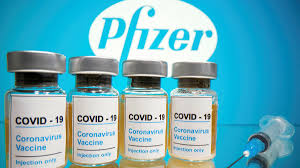Study suggests that Pfizer vaccine is effective after one dose

This is potentially yoooge:
The Covid-19 vaccine developed by Pfizer Inc. and BioNTech SE generates robust immunity after one dose and can be stored in ordinary freezers instead of at ultracold temperatures, according to new research and data released by the companies.
The findings provide strong arguments in favor of delaying the second dose of the two-shot vaccine, as the U.K. has done. They could also have substantial implications on vaccine policy and distribution around the world, simplifying the logistics of distributing the vaccine.
A single shot of the vaccine is 85% effective in preventing symptomatic disease 15 to 28 days after being administered, according to a peer-reviewed study conducted by the Israeli government-owned Sheba Medical Center and published in the Lancet medical journal. Pfizer and BioNTech recommend that a second dose is administered 21 days after the first.
The finding is a vindication of the approach taken by the U.K. government to delay a second dose by up to 12 weeks so it could use limited supplies to deliver a single dose to more people, and could encourage others to follow suit. Almost one-third of the U.K.’s adult population has now received at least one vaccine shot. Other authorities in parts of Canada and Europe have prioritized an initial shot, hoping they will have enough doses for a booster when needed.
Preliminary data also suggest that the other widely used vaccine in the U.K. developed by AstraZeneca PLC and the University of Oxford could have a substantial effect after a first dose.
To return to a pet peeve, the article doesn’t contain the critical data about how many hospitalizations and deaths occurred among the minority of one-shot vaccinated people who were symptomatic; I’m going to speculate that the answer is “zero.”
Reluctant as I am to admit that Boris Johnson is right about something, I think the case for getting the first doses done first and delaying the booster shots is becoming pretty compelling.
This is also encouraging:
Separately, the vaccine, which has been authorized in the U.S., the U.K., the EU and elsewhere, can be stored and transported at between minus 25 and minus 15 degrees Celsius, or minus 13 and 5 degrees Fahrenheit—similar to a consumer freezer—Pfizer and BioNTech said. Currently, the vaccine’s labels say it must be stored at between minus 80 and minus 60 degrees Celsius, requiring sophisticated equipment.
The news isn’t all good — the disruption in vaccine distribution caused by the winter storm is unfortunate — but this all seems like a pretty big deal.
…As Paul elaborates in comments:
There’s a weird reluctance on the part of the media to highlight that the vaccines appear to have something very close to 100% efficacy in preventing serious illness. This is far more important in the long run than the question of whether the vaccines completely prevent transmission.


